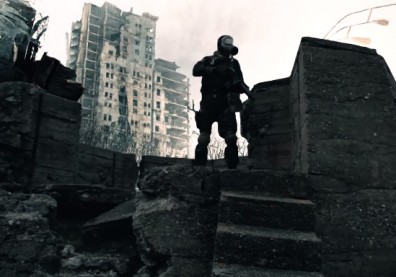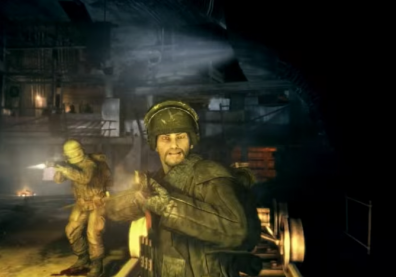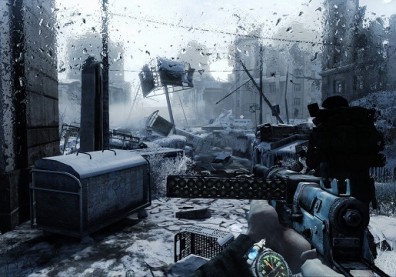While the Xbox 360's hardware held back the original Metro 2033 and the PC version required a high-end rig, the power of the PlayStation 4 and Xbox One has allowed developer 4A Games to take another crack at executing the experience the team originally envisioned.
Metro Redux contains both Metro 2033 Redux and Metro Last Light Redux, and first we'll take a look at the former.
***
Metro 2033 is a survival-horror shooter based on the novel of the same name by Russian author Dmitry Glukhovsky. The game places the player in post-apocalyptic Russia, wherein the surface is decimated and most survivors live in the relative safety of the nation's metro system. You play as Artyom, a young man initially tasked with delivering an important message about his home station's dire situation. The threat from mutated beasts is growing rapidly, and the small militia is ill-equipped to deal with the attacks much longer--help from larger forces is needed.
In the metro, resources in general are scarce and high caliber ammunition is used as currency. Regular ammo for your weapons comes at a premium, and venturing to the destroyed fallout-ridden surface requires a mask, which needs filters to operate effectively. These filters only work for a certain amount of time before you begin to suffocate, so a sufficient stock of them is needed to live through your excursions above ground.
This delicate balance of resources is combined with first-person combat against the mutants that roam the tunnels and desolate surface, as well as various hostile human factions that are often even more deadly. It's a unique mix of survival elements and traditional shooting and, as a result, Metro 2033 adds up to a constantly tense and memorable experience.
Metro 2033 Redux improves on the original in just about every area, with superior graphics and additional gameplay mechanics from the title's sequel. Developer 4A Games has thoughtfully given the game a considerable facelift, while also including major features from Last Light such as weapon customization--any gun can be outfitted with new sights or other upgrades, if you're willing to part with your military-grade ammo.
For Metro 2033 on Xbox 360, the hardware held back the graphics and the game carried several bugs and imperfections. The experience on PC was better if played on a powerful rig, but the remastered edition on the new consoles is undoubtedly the definitive version of an already great game. It looks fantastic on PlayStation 4, with convincing shadows and lighting helping to provide a very believable underground world. The character models aren't the best I've seen, but they are well-done, and represent an upgrade to those in the original game.
The improved visuals feed into Metro 2033 Redux's creepy and dark environments, contributing greatly to the immersion and tense moments. Artyom is often forced to venture through underground tunnels, and the variety of fast-moving mutated enemies have a habit of lunging out from shadowy corners. Perhaps more importantly for the experience, you'll always be worried something could be hiding around the corner, even if that doesn't turn out to be the case. Next time, it very well might be.
This leads to a constant state of wariness and caution, especially since you can't be wasting ammunition in an ill-conceived firefight--it's best to catch enemies unaware, rather than the other way around. Because of the subterranean setting, your flashlight and night vision goggles will be your closest companions, and both must be kept charged with a handheld generator. This can be taken out at any time to prime the equipment, and spare moments should be used to do so--the last thing you want is to lose the light source during a firefight. Shadows and flickering bulbs or candles adorn most interiors (aside from those that put you in complete darkness), and the outside world at night is as imposing as it is impenetrable.
As such, the Metro 2033 experience is not a straight jump-out-of-your-seat horror game (even though some moments will startle you), but one that instills a creeping sense of danger at every turn--exploration can turn fatal very quickly. The improvements in Metro 2033 Redux are woven into the very core experience and are difficult to pick out individually: the visuals are superior to the original, there are new mechanics seamlessly integrated into the gameplay, and the overall package is better for it.
As for what Artyom is actually doing in the game, well, it's not always as entirely clear as it could be. Settlements in the metro are divided into stations, which often represent different aspects of society. The Polis station gathered many of the remaining scientists, for example, and is one of the most important stations in the game's world. Another is dedicated to the arts, while others are controlled by the competing Nazi and Communist regimes, which both end up playing a part in your mission. Artyom is bounced around between these locales, his quest somewhat turning into the task of continually seeking out a string of characters, who in turn send you to another distant target.
That's not quite as poorly implemented as that may sound--the different stations feel alive and are interesting to explore, and 4A has crafted a believable underground universe with developed lore and characters. But there could be a bit more clarity and agency in your mission. There is also a persistent supernatural element focused around the mutated enemies, who have the ability to telepathically get inside everyone's heads--including Artyom's. This muddles exactly what's occurring along the way, and while it makes for some neat effects and mysterious scenes that tie into the plot, your ultimate objective doesn't become clear until very late into the game.
Artyom is a silent protagonist in the mold of Half-Life's Gordon Freeman, an unexpected hero who turns out to be quite good at managing to survive and kill. The decision to not have him speak results in some awkward situations, though: characters will occasionally ask a question, and then quickly follow up by saying something like, 'you don't have to answer'. Well, comrade, I couldn't if I wanted to--and I often would have liked to, given the option.
These follow-up comments are the game's transparent way of acknowledging that you, of course, will not be answering any queries. But it makes me wonder why the writers crafted the dialogue in a way that pulls the player out of the experience, reminding you that you're playing a game in which there's no way to respond. Characters will sometimes asked worriedly if you're okay, and the only course of action is to stare blankly back at them until they continue speaking. It's not a major issue, but--especially given that Artyom vocally narrates diary entries between chapters--it's an odd choice that can ruin the immersion. A few lines of spoken dialogue outside of the loading screens could have gone a long way.
Your story will take you through the 'civilized' metro and into enemy territory, where tragedy (Metro 2033 certainly has no issue killing off characters) and capture often await. Artyom is pretty lucky at times, it must be said, while an array of helpful friends will come and go due to either death or necessity. Combat sections against human enemies were some of my favorite parts of the game: the stealth system is surprisingly good, and creeping through an enemy based with a silenced weapon and quiet assassinations is very satisfying. There are lights that can be switched off and lanterns that can be blown out to hide your movements, and there are multiple ways to tackle each set piece. Additionally, you will occasionally feel as if you've failed, only to realize you've triggered a clever cutscene that pretty seamlessly took you from the gameplay into a plot-defining moment.
Journeying up to the surface is a difficult prospect, an event used sparingly enough to feel like a big moment when it must be done. Having a sufficient supply of mask filters is always a concern, and running low on breathing time can be panic-inducing (you should usually have just enough to last if you look around for spares). The experience above ground is different than what takes place below, with more open environments, clouded sunlight, and pesky fast-moving and aerial mutant enemies. These excursions are used intelligently to break up the longer underground segments, and this is an element of Metro 2033 that is applied effectively throughout. Just as you may be getting sick of underground caves filled with radiation and mutated enemies you stumble into a safe metro station, or are sent out into the ruins of Moscow.
The game is physically pretty linear, but there are enough ways to play and approach every situation that players can express themselves. I personally insisted on taking down enemy encampments with as much stealth as possible, even if it may have been quicker to run and gun. Metro Redux actually boasts two distinct gameplay modes that reflect these options and were not in the original games: Survival and Spartan. Survival offers an experience with less resources and a greater need for stealth (based on Metro 2033's gameplay), and Spartan more action-oriented gameplay with increased supplies (based on Metro Last Light). In this way, you can play either Redux title like the original design of the other.
You can only select those options at the start of a play through, which it makes it difficult to tell immediate differences--it would be more helpful if you could switch between them as you play. This is at least an option with the difficulty, allowing you to bump the game from Normal to Hardcore at any time, though you can't try out Ranger mode after you begin, which severely limits the game's HUD and player assistance. I began on Normal and switched to Hardcore after a few chapters--it was challenging and certainly caused many deaths, but I found it to be more rewarding than frustrating. Hardcore only forced me to turn the difficulty back to Normal for one segment in which you control a machine gun mounted on a rail car--it was simply more difficult than it needed to be, and was not worth the frustration.
The lore and political machinations developing in the background of Metro 2033 Redux help keep the underground realm interesting, and sallying forth to the world above ruled by mutants and radiation is always a daunting task. There are some worthwhile concepts at play with the Nazis and reds spouting their own poisonous rhetoric, and they help flesh out a simple storyline--it's unfortunate that the main narrative falls a bit flat and never coalesces into something more cogent.
A unique take on a post-apocalyptic world--no doubt one of the most frequently used settings in games and film--combined with a tense, well-defined atmosphere and constantly shifting gameplay segments come together for a very memorable experience. If Artyom's overarching tale (each individual section is well-made and enjoyable) had a bit more depth and development, I'd be much more willing to name this among the best games I've ever played.
In fact, despite the issues, it's still in the running--especially when compared to other shooters. There is a feeling that the series has gone somewhat overlooked, but Metro 2033 Redux--which comes closer to a deliberate labor of love than a simple HD upgrade--is highly recommended.
***
Metro Redux is an HD remake of both Metro 2033 and Metro Last Light for PlayStation 4, Xbox One, and PC. Metro 2033 released in 2010 for Xbox 360 and PC, while Last Light launched in 2013 for PC, Mac, Xbox 360 and PS3. The remastered games are available to purchase together on PSN, Xbox Live, and PC digital stores as Metro Redux for $49.99, or separately as individual titles. The product was reviewed on PS4 using a download code provided by publisher Deep Silver.





![METRO 2035-The Game [Мысли вслух]:Анонс на Gamescom 2016?](https://1779241332.rsc.cdn77.org/data/thumbs/full/53479/396/277/50/40/metro-2035-the-game-gamescom-2016.jpg)




